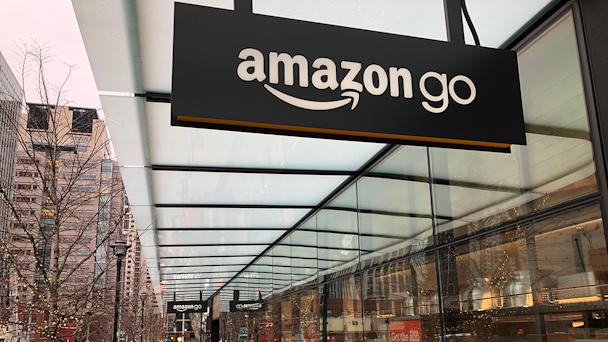A work of non-friction: is Amazon rewriting the retail rule book?
After disrupting many traditional sectors through its online presence, Amazon is now stepping into physical spaces, with tangible results. The Drum looks at how the brand is rewriting the rule book, most notably with retailer Whole Foods and its own Amazon Go store concept.

Amid something of a bibliophile renaissance, Amazon is going back to basics.
When Amazon launched in 1994 it declared itself to be ‘Earth’s Biggest Bookstore’. Almost 25 years later, the strapline feels laughably out of step with the money-making juggernaut it has become.
However Amazon has, throughout its lifecycle, remained true to its roots as a purveyor of paperbacks, going on to disrupt the category with the Kindle e-reader and self-publishing services.
And amid something of a bibliophile renaissance, Amazon is going back to basics.
Last year it announced plans to open a bricks-and-mortar bookstore in Manhattan. Meanwhile, its own physical imprint has in the past few months launched a division dedicated to short fiction reads.
Amazon is also taking a back to the future approach to retail. Its now-famed checkout-free Amazon Go opened recently to shoppers in Seattle, and the company has a network of Whole Foods stores throughout Canada, the US and UK.
Omnichannel experiences
“Amazon is coming at these industries from a position of no baggage,” muses Teaque Lenahan, regional director of business design and strategy at Fjord Seattle.
“Digitally native companies such as Amazon already know how to interact with consumers in that context, so in many ways it is an easier play for them to shape this digitally enabled, physical experience, than it is for traditional bricks-and-mortar players.”
Publishers in particular are likely to find themselves caught between the draw of a mutually beneficial relationship with Amazon and the memory of the disastrous impact that bringing sales online had on stores like the now defunct Borders.
Cory Cruser, experience innovation partner at creative consultancy Lippincott, argues that Amazon is not so much moving into the industries it helped kill, but rather shaping future behavior.
“With behavior changes come new ways to create value for customers, and reinterpreting traditional models is one way to do that, improving them in line with the behavior shift.”
Too much influence?
Aydin Moghaddam, head of PPC at digital agency Roast, laments the lack of competition Amazon asserting its dominance in these areas would bring about.
“Amazon has too much influence, and there cannot be perfect competition when one company has that,” he says.
Fjord’s Lenahan, meanwhile, is more pragmatic. “At the moment, Amazon’s foray into the physical market is either primarily for customer learning, or not yet scalable,” he says.
What’s next?
For Simon Law, chief strategy officer at WPP agency Possible, there is no irony in its forays into physical retail.
“It’s brilliant. The company has more than $22bn in cash and is using it to explore what the future looks like and how to keep retail innovating. It is investing in the new, the different and the explorative. It is doing what all business that are in decline failed to do.”
As for what’s next, Moghaddam predicts Amazon will acquire a fashion retailer, while Lenahan notes that as Amazon could trade on transparency to make money in the media arena.
For Cruser, it’s finance. “The industry ripe for massive disruption is banking, simply because the systems in this industry have not kept pace with the changing nature of our relationship with money,” he says.
Whatever happens, the company that started out as the world’s biggest bookseller is rewriting the rule book when it comes to disruption.
Content created with:

Amazon
Find out more
Whole Foods
Whole Foods Market Inc. is an American supermarket chain that specializes in selling organic foods products without artificial additive products for growing foods,...
Find out more
